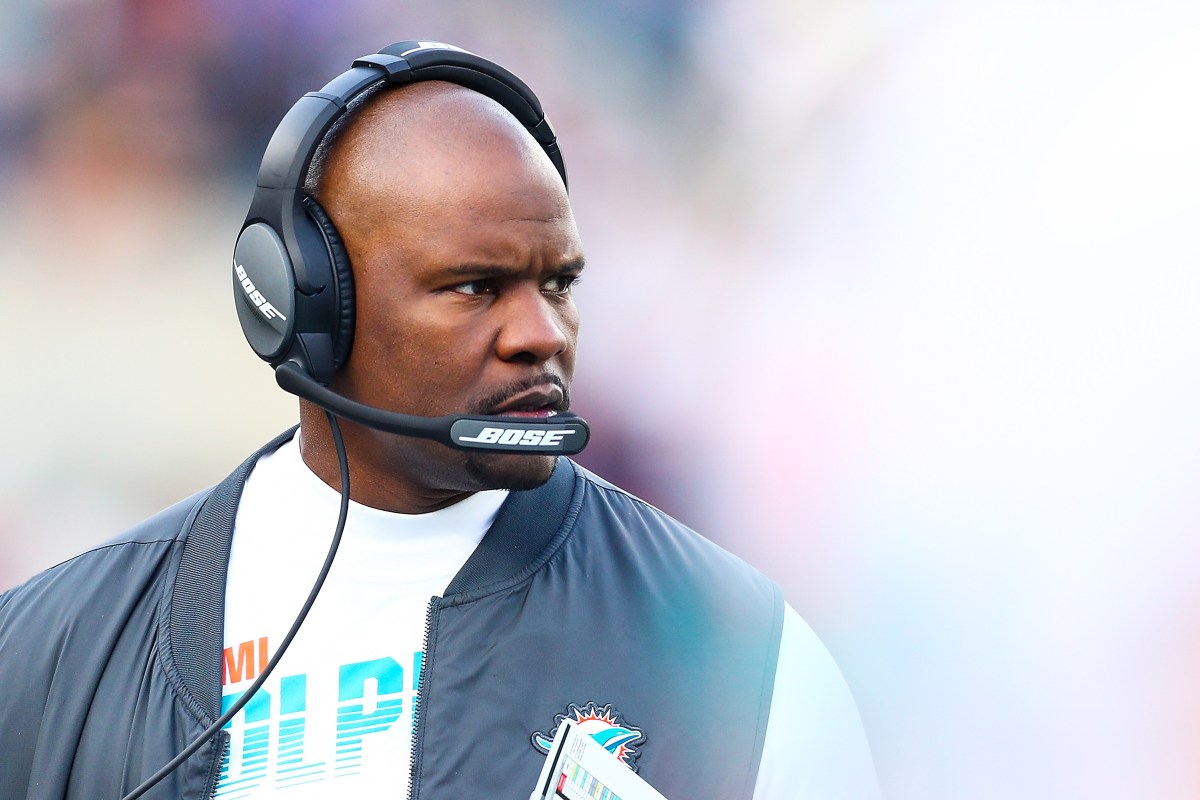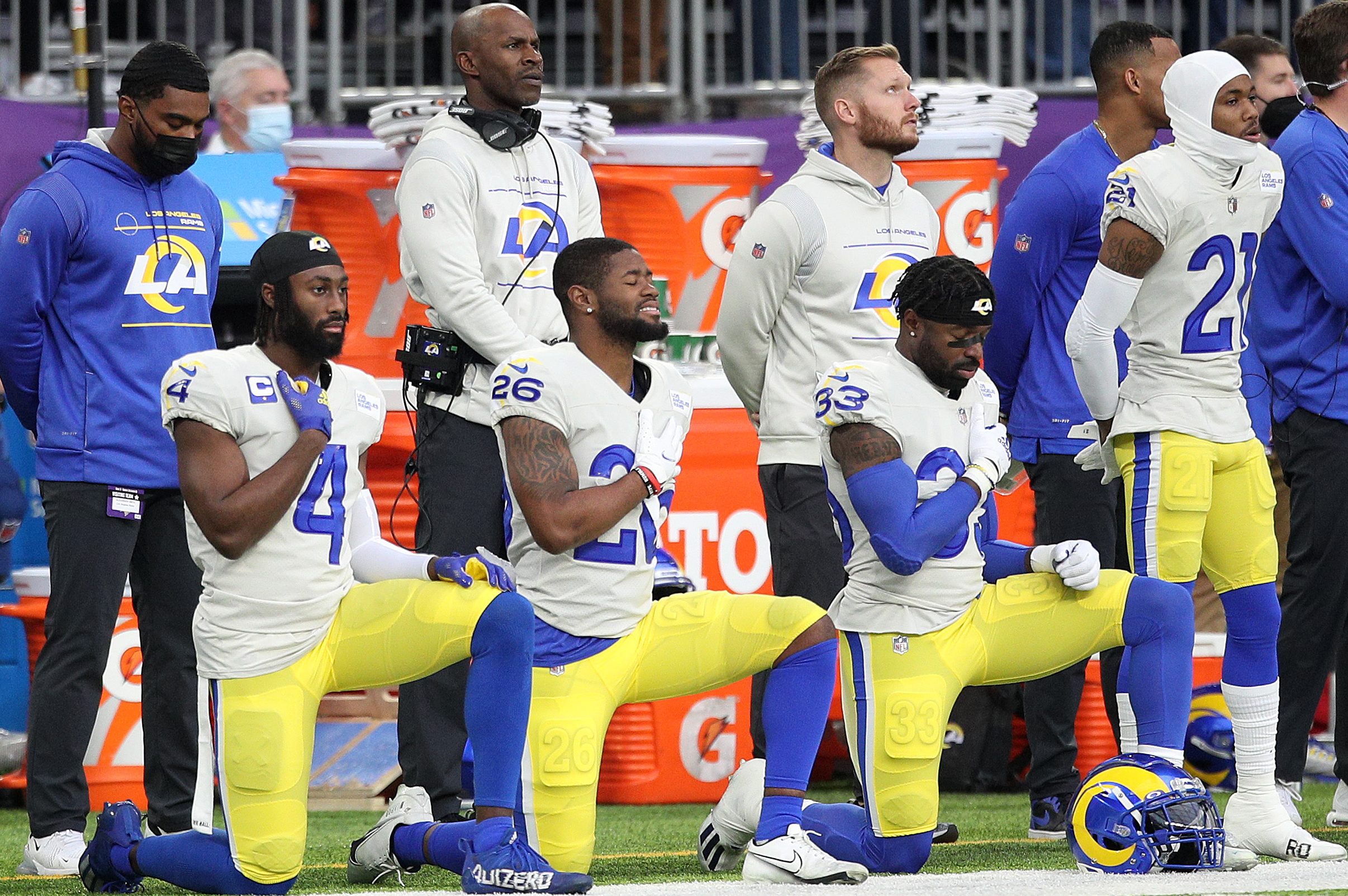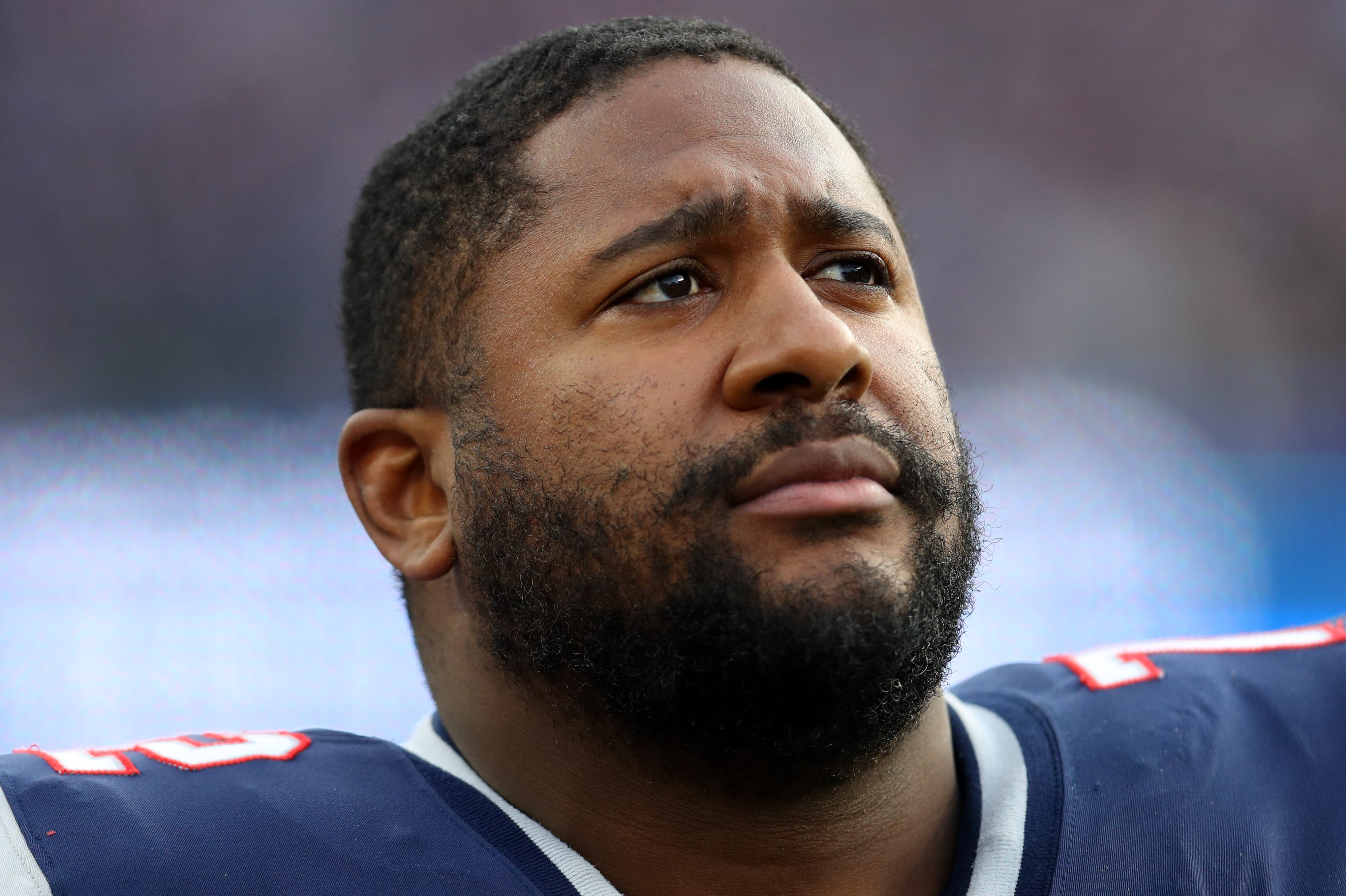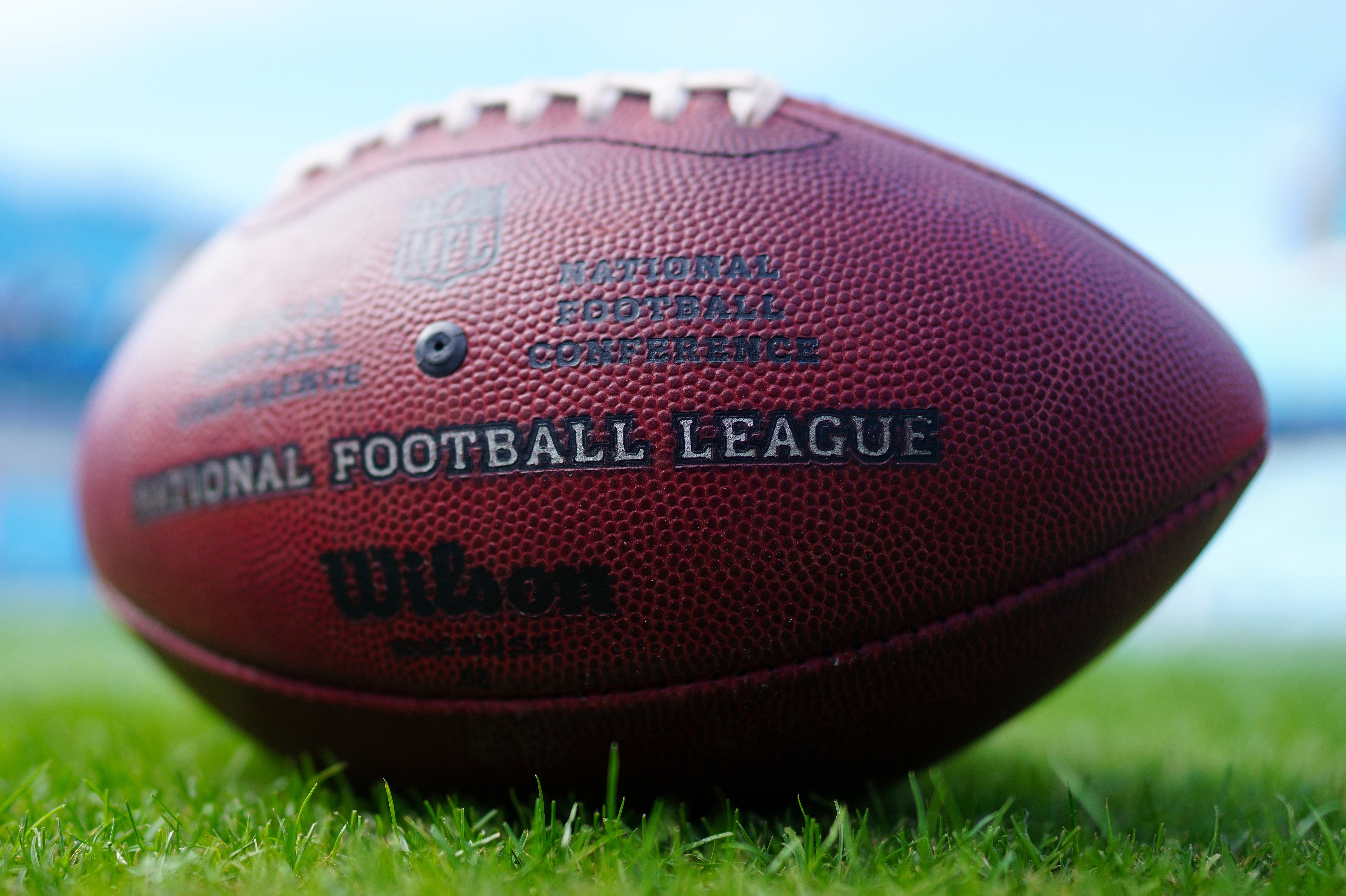By now you’ve probably heard about Bill Belichick’s alleged texting snafu, the one that appears on the first page of the class action lawsuit Brian Flores filed against the NFL yesterday. The Patriots coach congratulated Flores — his former assistant and the recently terminated head coach of the Miami Dolphins — on becoming the next head coach of the New York Giants.
Flores was confused. He hadn’t even interviewed with the Giants yet. He asked Belichick if he meant to text him or Brian Daboll, the Buffalo Bills’ offensive coordinator who also spent time in New England and had recently interviewed with the Giants.
After a short radio silence, Belichick replied.
“Sorry,” he wrote. “I fucked this up.”
The 58-page complaint Flores’s lawyers filed with the southern district court of New York is loaded with revelations. A few are whimsically amusing — based on his press conferences, who would’ve guessed Belichick punctuates his texts just like every other baby boomer — but most are disturbing. In outlining Flores’s individual case as a victim of racial discrimination, his legal team also presents a thorough and forceful accounting of the NFL’s troubling history with race.
We encourage readers to review the document for themselves — it’s powerful and, as far as legal writing goes, very accessible — but we know you’re busy. InsideHook read the court filing and identified the most damning revelations, which we’ve excerpted with commentary below.
Dolphins’ owner Stephen Ross offered to pay Flores $100,000 for every game he lost
Mr. Ross wanted the [sic] Mr. Flores to “tank” the season to put the team in position to secure the first pick in the draft. Indeed, during the 2019 season, Mr. Ross told Mr. Flores that he would pay him $100,000 for each game lost that year. Then, when the Dolphins started winning games, due in no small part to Mr. Flores’ coaching, Mr. Flores was told by the team’s General Manager, Chris Grier, that “Steve” was “mad” that Mr. Flores’ success in winning games that year was “compromising [the team’s] draft position.”
The next time you spar with some dinner party ideologue who tells you “professional sports teams don’t tank, you’re just a conspiracy theorist,” counterpunch with this. But seriously. This sucks to hear if you’re a Dolphins fan. Then again, nobody is more used to Ross’s negligently absent ownership than Dolphins fans, so maybe it’s not as shocking. The NFL’s new partners over at DraftKings can’t be too thrilled with this news either.
Ross repeatedly tried to get Flores to tamper with another team’s quarterback, including orchestrating an “impromptu” meeting on his yacht
After the end of the 2019 season, Mr. Ross began to pressure Mr. Flores to recruit a prominent quarterback in violation of League tampering rules. Mr. Flores repeatedly refused to comply with these improper directives. Undeterred, in the winter of 2020, Mr. Ross invited Mr. Flores onto a yacht for lunch. Shortly after he arrived, Mr. Ross told Mr. Flores that the prominent quarterback was “conveniently” arriving at the marina. Obviously, Mr. Ross had attempted to “set up” a purportedly impromptu meeting between Mr. Flores and the prominent quarterback. Mr. Flores refused the meeting and left the yacht immediately. After the incident, Mr. Flores was treated with disdain and held out as someone who was noncompliant and difficult to work with.
It’s hard to imagine the unidentified “prominent quarterback” is anyone other than Tom Brady, but that’s beside the point. Ross, a league owner, knowingly and repeatedly pushed an employee to violate a major league rule. A big story to monitor over the coming weeks is how the league addresses this accusation — which crisis management strategy will it deem less disruptive to its image and bottomline, spin or accountability?
As it pertains to the Flores case, the main story here is that his refusal to act dishonestly is ultimately what set the stage for his termination this January despite leading the Dolphins to their second consecutive winning season.
From that point forward, Mr. Flores was ostracized and ultimately he was fired. He was subsequently defamed throughout the media and the League as he was labeled by the Dolphins brass as someone who was difficult to work with. This is reflective of an all too familiar “angry black man” stigma that is often casted upon Black men who are strong in their morals and convictions while white men are coined as passionate for those very same attributes.
The NFL’s Rooney Rule is even more of a sham than we realized
When the Rooney Rule was instituted in 2003, there were three Black head coaches in the NFL. Today there is one. This is how progress can be regressive. Despite the Rooney Rule’s noble intention, in practice, it has rarely been treated as anything more than a formality.
It is not working because the numbers of Black Head Coaches, Coordinators and Quarterback Coaches are not even close to being reflective of the number of Black athletes on the field. The Rooney Rule is also not working because management is not doing the interviews in good-faith, and it therefore creates a stigma that interviews of Black candidates are only being done to comply with the Rooney Rule rather than in recognition of the talents that the Black candidates possess.
Even after Flores received Belichick’s text revealing the Giants’ intention to hire Daboll, Flores attended a dinner and then an interview with Giants’ management. Just try to put yourself in his position. Having grown up in New York, Flores often described the Giants’ job as his “dream job.” Interviewing for it should’ve been the pinnacle of his career. Instead, he went into the meeting with the humiliating knowledge that it was nothing more than a discriminatory charade.
Mr. Flores had to give an extensive interview for a job that he already knew he would not get—an interview that was held for no reason other than for the Giants to demonstrate falsely to the League Commissioner Roger Goodell and the public at large that it was in compliance with the Rooney Rule.
John Elway showed up hungover to Flores’s 2019 interview with the Broncos
Incredibly, [the Giants’ interview] was not Mr. Flores’ first sham interview that was held only in an effort to comply with the Rooney Rule. Indeed, in 2019 Mr. Flores was scheduled to interview with the Denver Broncos. However, the Broncos’ then-General Manager, John Elway, President and Chief Executive Officer Joe Ellis and others, showed up an hour late to the interview. They looked completely disheveled, and it was obvious that they had [been] drinking heavily the night before. It was clear from the substance of the interview that Mr. Flores was interviewed only because of the Rooney Rule, and that the Broncos never had any intention to consider him as a legitimate candidate for the job.
Again, try to empathize with Flores. He’s interviewing for one of the most competitive jobs on the planet. The guy doing the interviewing is the pride of the franchise — a big-swinging-dick who won Super Bowls on the field and now runs the front office — and he shows up an hour late, the stench of a good night still on him, with zero intention of taking the interview seriously.
The Washington Football Team has always been one of the most racists franchises in the NFL
In 1933, the League had only two Black players, but they left at the end of the year, leaving the NFL with none. At this point, the NFL was reportedly financially viable and no longer needed Black players to fill vacant positions.
This led to one of the most despicable moments in the history of professional sports in the United States: it is widely accepted that the NFL used the absence of Black players as an opportunity to impose a “gentleman’s agreement” to ban Black players entirely.
This initiative was led by the Washington Football Team’s owner George Preston Marshall. The League’s other founding owners—including but not limited to, Tim Mara of the New York Giants—appear to have colluded and cooperated in this widespread racial ban.
NFL owners engaging in an unwritten agreement to ban players for racial reasons? Never! (Just don’t talk to Colin Kaepernick if you genuinely believe that. Also, I’ve got a great bridge to sell you.) Black players didn’t return to the league until 1946, and that was only because a court forced the Rams, who played in the publicly funded Los Angeles Coliseum, to have at least one Black player in order to comply with the Supreme Court’s Plessy v. Ferguson segregation decision.
NFL teams didn’t engage in full-scale racial integration until much later. Washington was one of the last teams to sign a Black player. Even in death, the team’s owner proved to be a racist bastard.
In fact, though the NFL had integrated 23 years earlier, when Washington’s owner, Mr. Marshall, died in 1969, he abhorrently stipulated that his estate be used to establish the Redskins Foundation, on the condition that it was barred from spending money for “any purpose which supports or employs the principle of racial integration in any form.”
George Marshall was inducted into the NFL’s Hall of Fame in 1963, and you can still visit his bust in Canton today.
Successful Black NFL coaches are 3.5 times more likely to be fired than white coaches
Since 1978, only 16 winning teams have fired their head coach (3%). Even though Black men only held a small fraction of the Head Coach positions during that time, an astounding 25% (four of the 16) of the Head Coaches fired after a winning season were Black. This statistic is even more remarkable given that there have only ever been 17 Black Head Coaches who have coached a full season, and four of them (23.5%) were fired after a winning season. In contrast, only 6.9% of white coaches were fired after a winning season (12 out of 174). Thus, Black Head Coaches are 3.5 times more likely to be fired even when successful.
Statistics like this illustrate a pattern of longstanding systemic discrimination and will be difficult for the NFL to defend. (Though they’ll have the best lawyers money can buy.) Any argument that this sample size is too small for meaningful analysis is undone by its supposition: why have there only been 17 Black head coaches to make it through a full season? In framing Flores’s case as a class action, his lawyers are opening the door for similarly aggrieved plaintiffs to join the lawsuit.
***
One of the most rhetorically powerful sections of the court filing comes when Flores’s lawyers compare the NFL’s ownership structure to plantation economics. It’s not the first time such a comparison has been suggested — Lebron James and Richard Sherman have made public statements to such an effect — but the language in Flores’ complaint is compelling.
In certain critical ways, the NFL is racially segregated and is managed much like a plantation. Its 32 owners—none of whom are Black—profit substantially from the labor of NFL players, 70% of whom are Black. The owners watch the games from atop NFL stadiums in their luxury boxes, while their majority-Black workforce put their bodies on the line every Sunday, taking vicious hits and suffering debilitating injuries to their bodies and their brains while the NFL and its owners reap billions of dollars.
Through practices such as “race norming” cognitive assessments of players and holding Black coaches to a double standard, the NFL and its owners have long engaged in flagrantly discriminatory practices. Their day of reckoning is long overdue.
It was no coincidence that Flores filed his suit on February 1, the first day of Black History Month. On the first page, directly under Belichick’s evidentiary text message, there’s a quote from Dr. Martin Luther King, Jr. “Morals cannot be legislated, but behavior can be regulated. The law cannot make an employer love me, but it can keep him from refusing to hire me because of the color of my skin.”
Flores is willing to sacrifice personal gain to test the resolve of the law. He’s still in the running to fill head coaching vacancies with the Saints and Texans, but it’s hard to see either of those materializing considering he’d be actively engaged in a suit against his new employer. Morality can’t be legislated, that’s true. But in some cases, it’s easy to separate right from wrong. This is one of them.
The Charge will help you move better, think clearer and stay in the game longer. Subscribe to our wellness newsletter today.























